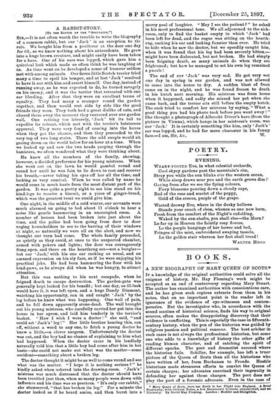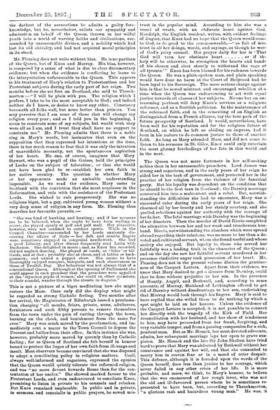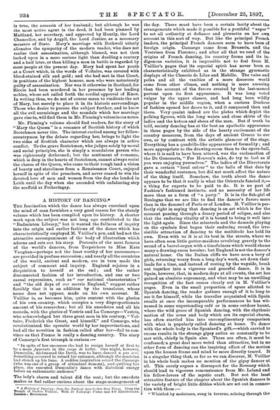BOOKS.
A NEW BIOGRAPHY OF MARY QUEEN OF SCOTS.* IF a knowledge of the original authorities could solve all the enigmas of history, Mr. Hay Fleming's work might be accepted as an end of controversy regarding Mary Stuart. The author has examined authorities with conscientious care, and he has given such copious extracts from them in his notes, that on no important point is the reader left in ignorance of the evidence of eye-witnesses and contem- poraries. But the investigator who, in accordance with the sound maxims of historical science, finds his way to original sources, often makes the disappointing discovery that their evidence is conflicting. This is especially the case in fifteenth- century history, when the pen of the historian was guided by religions passion and political rancour. The best arbiter in such cases is not always the professional historian, but some one who adds to a knowledge of history the other gifts of reading Yuman character, and of catching the spirit of different epochs. The poet and dramatist succeed where the historian fails. Schiller, for example, has left a truer picture of the Queen of Scots than all the historians who have written of her, from Buchanan to Fronde. Hostile historians made strenuous efforts to convict the Queen of certain charges ; her advocates exercised their ingenuity in defending her against those charges. The poet does not play the part of a forensic advocate. Even in the case of
• Mary Queen of Scots, from her Birth to her Flight into England. A Brief Biography, with Critical Notes, a few Documents hitherto unpublished, and azu Itinerary. By David Ray Fleming. London: fodder and Stoughton.
the darkest of the accusations he admits a guilty fore- knowledge, but be, nevertheless, enlists our sympathy and admiration on behalf of the Queen, thrown in her wilful
youth into a world of warring faiths and civilisations, sur- rounded by unreasonable divines, and a nobility which had lost its old chivalry, and had not acquired moral principles in•its stead.
Mr. Fleming does not write without bias. He is no partisan of the Queen, but of Knox and Murray. His bias, however, is tempered by a sense of what is due to clear documentary evidence; but when the evidence is conflicting he leans to the interpretation unfavourable to the Queen. This appears
in his treatment of Mary's relation to Protestantism and her Protestant subjects during the early part of her reign. Two months before she set foot on Scotland, she said to Throck- morton :—" I will be plain with you. The religion which I profess, I take to be the most acceptable to God ; and indeed neither do I know, or desire to know any other. Constancy becometh all folks well, but none better than princes. You may perceive that I am none of these that will change my religion every year ; and as I told you in the beginning, I mean to constrain none of my subjects, but would wish they
were all as I am, and I trust they shall have no support to constrain me." Mr. Fleming admits that there is a noble ring in Mary's words, but insinuates that even on the supposition that they expressed her intentions at the time, there is too much reason to fear that it was only the intention of unavoidable necessity, not the spontaneous aspiration of her heart. No one, of course, imagines that Mary Stewart, who was a pupil of the Guises, held the principles of Locke on the subject of toleration ; or that she would not have been glad to re-establish her own faith in her native country. The question is whether Mary or her opponents made an amicable understanding impossible. As we read the evidence, Mary came to Scotland with the conviction that she must acquiesce in the Reformation, and rule with the assistance of the Protestant Lords. She wished to rule prosperously. She was no religious bigot, but a gay, cultivated young woman without a very deep sense of religion in any form. Mr. Fleming thus describes her favourite pursuits :-
" She was fond of hawking and hunting ; and if her accusers are to be believed, when she ought to have been wailing in secret, she played openly at golf and pall mall. Her pleasures, however, were not confined to outdoor sports. While in the Council Chamber—surrounded by her Lords anxiously dis- cussing the affairs of State — her deft and nimble fingers were sometimes engaged in congenial needlework. She had a good Library, and after dinner frequently read Latin with Buchanan. She delighted in music ; and, as Knox has recorded, did not neglect dancing. She played at cards, at biles ' or bil- liards, and at dice ; probably also at chess, and at tables or back- gammon; and owned a puppet show. She seems to have thoroughly enjoyed masques, banquets, and such observances as those of Twelfth Day. Her behaviour was not always that of a conventional Queen. Although at the opening of Parliament she could appear in such grandeur that the preachers were appalled at the stricken pryde of wemen,' she could on other occasions, to their scandal, wander through the streets in disguise."
This is not a picture of a bigot meditating how she might restore the Mass. Once only did she display what might be regarded as strong Catholic feeling. Two months after her arrival, the Magistrates of Edinburgh issued a proclama-
tion charging "all monks, friars, priests, nuns, adulterers, fornicators and such filthy persons to remove themselves from the town under the pain of carting through the town, burning on the cheek, and banishment from the same for ever." Mary was much moved by the proclamation, and im-
mediately sent a mater to the Town Council to depose the Provost and bellies from their office. In this instance she was, however, probably more moved by queenly than by Catholic feeling ; for as Queen of Scotland she felt herself in honour bound to protect the lieges of her own faith from ill-usage and insult. Most observers became convinced that she was disposed to adopt a conciliating policy in religions matters. Cecil, always well-informed and sagacious, expressed the opinion that the Queen would quietly tolerate the reformed religion, and was "no more devout towards Rome than for the con- tentation of her uncles." She showed marked favour to the Protestant Lords, and even endeavoured to conciliate Knox, promising to listen in private to his counsels and rebukes. But Knox remained implacable. In public and in private, in sermons, and especially in public prayers, he sowed mis- trust in the popular mind. According to him she was a vessel of wrath, with an obdurate heart against God. Randolph, the English resident, writes, with evident feelings of disgust, that Knox had no hope that the Queen would come to God, or do good to the commonwealth,—" as full of mis- trust in all her doings, words, and sayings, as though he were of God's privy council. Hia prayer daily for her is That
God will turn her obstinate heart or if the holy will be otherwise, to strengthen the hearts and hands of his chosen and elect stoutly to withstand the rage of all tyrants." Knox has been blamed for his rudeness towards the Queen. He was a plain-spoken man, and plain speaking would have done no harm at the Court of Holyrood had he been loyal to his Sovereign. The more serious charge against him is that he sowed mistrust and encouraged rebellion at a time when the Queen was endeavouring to act with equal justice towards all classes of her subjects. No one but an un- reasoning partisan will deny Knox's services as a religious reformer, and as a Scottish politician. In the maintenance of the reformed faith, and in the cementing of an English as distinguished from a French alliance, lay the true path of the future prosperity of Scotland. It would, nevertheless, have been well for his reputation and for the religious future of Scotland, on which he left so abiding an impress, had it been in his nature to do common justice to those of another faith. As long as Mary attended Mass, and did not come to listen to his sermons in St. Giles, Knox could only entertain the most gloomy forebodings of her fate in this world and• in the next.
The Queen was not more fortunate in her self-seeking nobles than in her unreasonable preachers. Lord James was strong and sagacious, and in the early years of her reign he aided her in the task of government, and protected her in the practice of her religion from the violence of the fanatical party. But his loyalty was dependent on the condition that he should be the first man in Scotland ; the Darnley marriage converted him into a malcontent and a rebel. But, notwith- standing the difficulties she had to encounter, Mary was a successful ruler during the early years of her reign. She charmed all by her beauty and her stately courtesy, and she quelled rebellions against her authority with the courage of her father. The fatal marriage with Darnley was the beginning of her disasters. Then the murder of David Riccio completed the alienation between her and her weak and treacherous hus- band. Riccio, notwithstanding the slanders which were spread abroad regarding their relations, was no more to her than a de- voted and cultivated servant, whom she found useful and whose society she enjoyed. But loyalty to those who served her faithfully was a leading trait in the character of the Queen ; and on the day she saw her faithful servant murdered in her presence vindictive anger took possession of her heart. Mr. Fleming does not in the present volume discuss the genuine• ness of the Casquet Letters. Apart from their evidence, we know that Mary desired to get a divorce from Darnley, could that be done without prejudice to her son. In the presence of Huntly, Argyll, and Bothwell, and, according to some accounts, of Murray, Maitland of Lethington offered to get rid of Darnley without disadvantage to her son, undertaking that Murray would look through his fingers. Mary is said to have replied that she willed them to do nothing by which a spot might be laid on her honour. Unless the evidence of the Casquet Letters is accepted, it is not possible to connect her directly with the tragedy of the Kirk of Field. Her reconciliation with her husband, and her show of tenderness to him, may have proceeded from her frank, forgiving, and very variable temper, and from a passing compassion for a sick, penitent man. But as Mr. Hosack, her most devoted advocate, admits, her subsequent marriage lays her open to grave sus- picion. Mr. Hosack and the late Sir John Skelton have tried hard to prove that Mary was abducted by Bothwell without her connivance and against her will, and that she consented to marry him in craven fear or in a mood of utter despair. This defence, although it is founded upon the words of the Queen herself, does less than justice to her courage, which never failed in any other crisis of her life. It is more probable, and more, we think, to Mary's honour, to believe that she was enamoured of her rough lover, who was not the old and ill-favoured person whom he is sometimes re- presented to have been, but, according to Throokmorton, "a glorious rash and hazardous young man." He was, it
is true, the assassin of her husband; but although he was the most active agent in the deed, it had been planned by Maitland, her secretary, and approved by Huntly, the Lord Chancellor, and by Argyll, the Lord Justice, as a necessary measure of State. Mary's marriage with Bothwell utterly alienates the sympathy of the modern reader, who does not realise that assassination, although blamed, was not then looked upon in a. more serious light than duelling a century and a half later, or than killing a man in battle is regarded by most people at the present day. Mary had spent her youth at a Court which, in the words of Voltaire, was covered with blood-stained silk and gold; and she had met in that Court, in positions of the highest honour, men who were notoriously guilty of assassination. Nor was it otherwise in Scotland, for Riccio had been murdered in her presence by her leading nobles, whose act called forth the cordial approval of Knox. In writing thus, we do not of course mean to vindicate the act of Mary, but merely to place it in its historic surroundings. Those who desire to pursue the subject further, and to know all the evil surmisings and the scandals which her marriage gave rise to, will find them in Mr. Fleming's voluminous notes.
Mr. Fleming's volume should find readers, for the story of "Mary the Queen" is a romance of Scottish history of which Scotchmen never tire. The interest excited among her fellow- countrymen by the debate regarding her, brings to light the two sides of Scottish character which are always in active conflict. To the grave Scotchman, who judges solely by moral and social principles, she is simply a scandalous person who was righteously dethroned; but the sentiment of romance, which is deep in the hearts of Scotchmen, cannot always resist the charm of the Queen, who came to their rough land a vision of beauty and stateliness from a Renaissance Court, enjoyed herself in spite of the preachers, and never ceased to win the devoted love of men and women from the day she landed in Leith until the day when she ascended with unfaltering step the scaffold at Fotheringay.




































 Previous page
Previous page